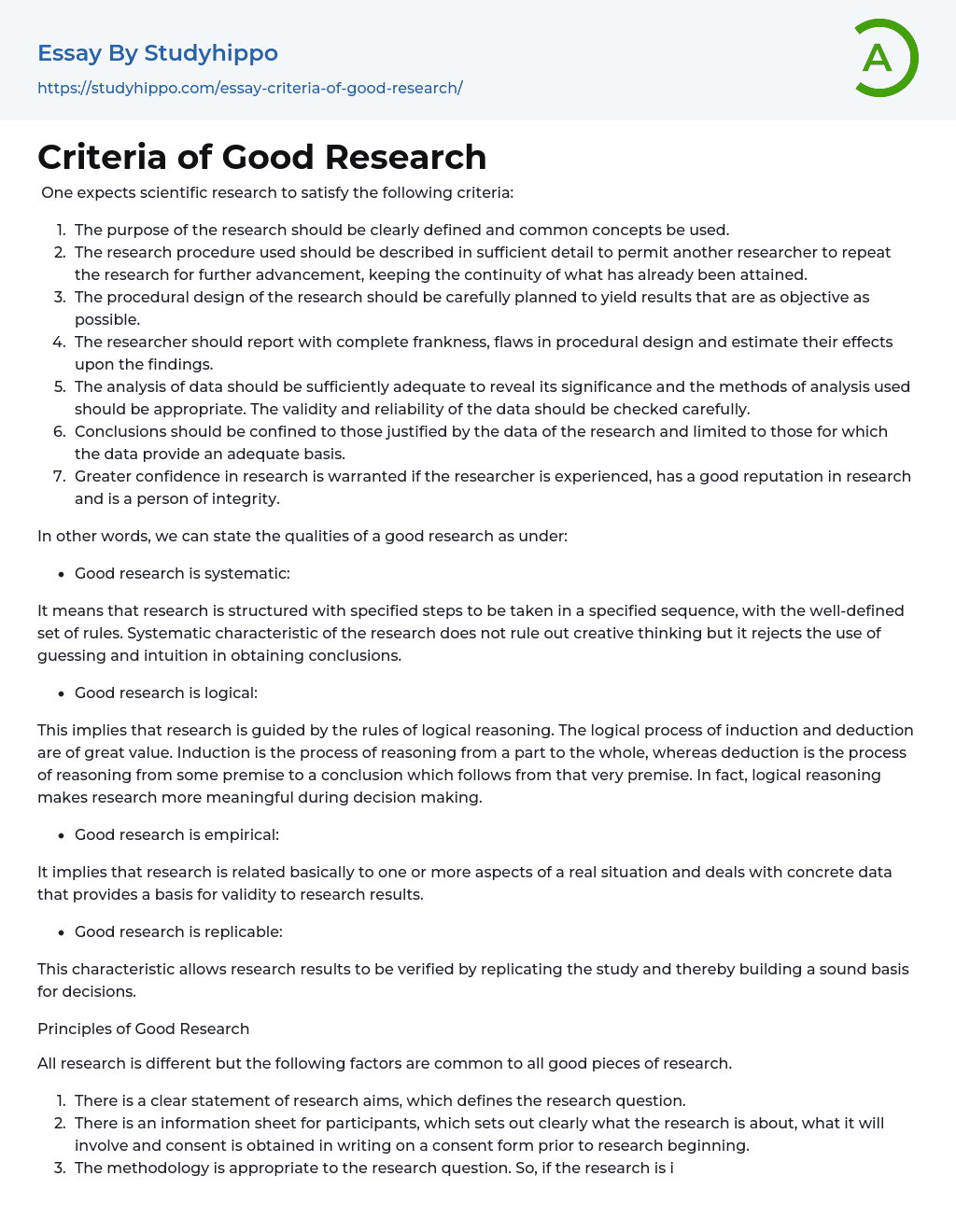One expects scientific research to satisfy the following criteria:
- The purpose of the research should be clearly defined and common concepts be used.
- The research procedure used should be described in sufficient detail to permit another researcher to repeat the research for further advancement, keeping the continuity of what has already been attained.
- The procedural design of the research should be carefully planned to yield results that are as objective as possible.
- The researcher should report with complete frankness, flaws in procedural design and estimate their effects upon the findings.
- The analysis of data should be sufficiently adequate to reveal its significance and the methods of analysis used should be appropriate. The validity and reliability of the data should be checked carefully.
-
lign: justify;">Conclusions should be confined to those justified by the data of the research and limited to those for which the data provide an adequate basis.
- Greater confidence in research is warranted if the researcher is experienced, has a good reputation in research and is a person of integrity.
In other words, we can state the qualities of a good research as under:
- Good research is systematic:
It means that research is structured with specified steps to be taken in a specified sequence, with the well-defined set of rules. Systematic characteristic of the research does not rule out creative thinking but it rejects the use of guessing and intuition in obtaining conclusions.
- Good research is logical:
This implies that research is guided by the rules of logical reasoning. The logical proces
View entire sampleJoin StudyHippo to see entire essay
of induction and deduction are of great value. Induction is the process of reasoning from a part to the whole, whereas deduction is the process of reasoning from some premise to a conclusion which follows from that very premise. In fact, logical reasoning makes research more meaningful during decision making.
- Good research is empirical:
It implies that research is related basically to one or more aspects of a real situation and deals with concrete data that provides a basis for validity to research results.
- Good research is replicable:
This characteristic allows research results to be verified by replicating the study and thereby building a sound basis for decisions.
Principles of Good Research
All research is different but the following factors are common to all good pieces of research.
- There is a clear statement of research aims, which defines the research question.
- There is an information sheet for participants, which sets out clearly what the research is about, what it will involve and consent is obtained in writing on a consent form prior to research beginning.
- The methodology is appropriate to the research question. So, if the research is into people’s perceptions, a more qualitative, unstructured interview may be appropriate. If the research aims to identify the scale of a problem or need, a more quantitative, randomised, statistical sample survey may be more appropriate. Good research can often use a combination of methodologies, which complement one another.
- The research should be carried out in an unbiased fashion. As far as possible the researcher should not influence the results of the
research in any way. If this is likely, it needs to be addressed explicitly and systematically.
- Research Methods essays
- Experiment essays
- Hypothesis essays
- Observation essays
- Qualitative Research essays
- Theory essays
- Explorer essays
- American Literature essays
- Between The World and Me essays
- Book Report essays
- Book Review essays
- Book Summary essays
- Books essays
- Character essays
- Coming of Age essays
- Dante's Inferno essays
- Everyday Use essays
- Flowers for Algernon essays
- Genre essays
- Greek Mythology essays
- Incidents in The Life of a Slave Girl essays
- Letter essays
- Literary Criticism essays
- Literary devices essays
- Literature Review essays
- Metaphor essays
- Myth essays
- Play essays
- Plot essays
- Poem essays
- Poetry Analysis essays
- Protagonist essays
- Reader essays
- Reason essays
- Rhetoric essays
- Rhetorical Question essays
- Rhyme essays
- Simile essays
- Tragic Hero essays
- Translation essays
- Understanding essays
- Utopia essays
- Villain essays
- Writer essays
- Coaching essays
- Critical Thinking essays
- homework essays
- Learning essays
- Library essays
- Listening essays




